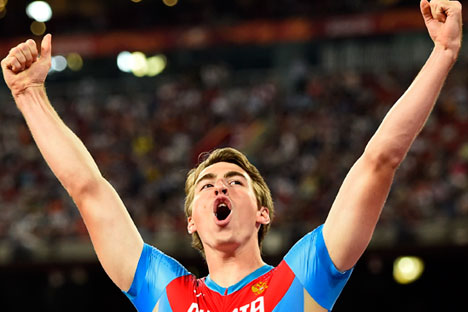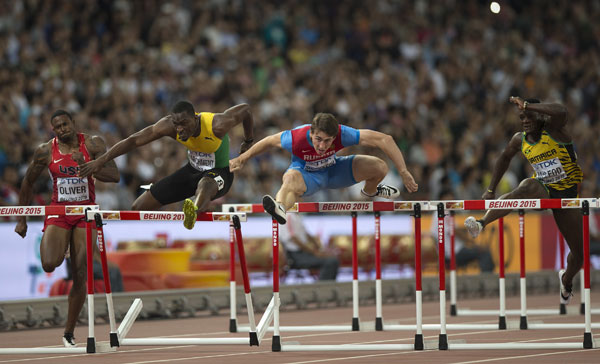
Sergey Shubenkov of Russia celebrates after winning the men's 110 metres hurdles final during the 15th IAAF World Championships at the National Stadium in Beijing, China August 28, 2015.
Reuters1. No Bolt, but stable
There is a new star on the world athletics track. The 24-year-old Sergey Shubenkov has become a pioneer for Russia as the first Russian ever to win the World Championships in the 110 m hurdles event.
Russian athletics has never been famous for its sprinters. Those who set the tenor in the track events are the United States and the Caribbean countries. It is no wonder that Shubenkov was immediately dubbed “the Russian Bolt”. Although he considers the comparison as outright flattery, Shubenkov does not diminish his abilities and achievements.
“I do not feel like I'm the best, but I feel like I'm the most stable one, because I perform at the same high level for three consecutive years. Nobody else in the world does so,” Shubenkov said in an interview to championat.com.
Could Shubenkov beat Bolt in the 100m flat dash, however, we will never know. He does not want to leave hurdles. There is too much of a difference between the two techniques to risk such experiments.
2. Not only sport
Sergey's mother, Natalia Shubenkova, is a champion athlete and a leader in the heptathlon. That does not, however, make their family the classic sports dynasty.

Source: TASS
“Not only did she never try to get me involved into all-round but also into athletics as such. The only thing my mother wanted me to do was to be busy with something. Sports, music school, painting class - anything went, as long as it kept me busy,” Shubenkov told championat.com. The youth decided only at age 16 to make sports his profession. Intensive training, however, has not been a hurdle to stop Shubenkov from learning English and obtaining a degree in law.
3. Grey London skies
Shubenkov could have made a name in the London Olympics in 2012. The athlete from Barnaul, Altai arrived in Albion as a rising star with a European championship title. However, the grey London skies and pre-event agitation played havoc with the young athlete and Shubenkov did not make it to the finals.
A year later, he won the bronze medal at the world championship in Moscow, stunning the judges with his superb technique. In Beijing, Shubenkov beat both David Oliver, the current world champion, and his American compatriot Aris Merritt, Olympic champion and current world record holder.
4. Media-Friendly
Shubenkov is quite unlike the old school Russian athlete, who was seen as terse, withdrawn, and spending all their time in grueling workouts at secluded training bases. He gives flash interviews, participates in photo shoots for trendy magazines (news about his revealing photo-shoot for Vogue got more Internet hits than the news of his victory at the European Championships, Shubenkov said), and he ‘tweets’ in English.
Shubenkov’s victories have won him points among his ‘colleagues’.
“As long as you are weaker than the Americans, they will never say hello. In order to make them notice you, you should beat them on the track at least once; it is like a pass to the elite club. Then they begin to wave to you, even if you are on the opposite end of the starting line”, Shubenkov said to championat.com.
5. Doping: everything personal
After the doping scandal when the whole group of Russian athletes was disqualified, every one of the country's athletes was under the scanner of the doping services. The revelatory films of German TV channel ARD aggravated an already complicated situation.
Shubenkov's coach Sergey Klevtsov said that once the doping officers of the Russian Anti-Doping Agency (RUSADA) appeared in training camp so early in the morning that they woke up all the athletes.
Sergey Shubenkov himself believes that clean sport is not so much a team responsibility as an individual one.
“If the coach offers you the pills, and you take it and eat it, don't go telling later that in Russia there is a whole system working. If the coach tells you, either you take it or you leave; go and change the coach, train independently,” said Shubenkov candidly in an interview to the newspaper ‘Sovetsky Sport’.
All rights reserved by Rossiyskaya Gazeta.
Subscribe
to our newsletter!
Get the week's best stories straight to your inbox